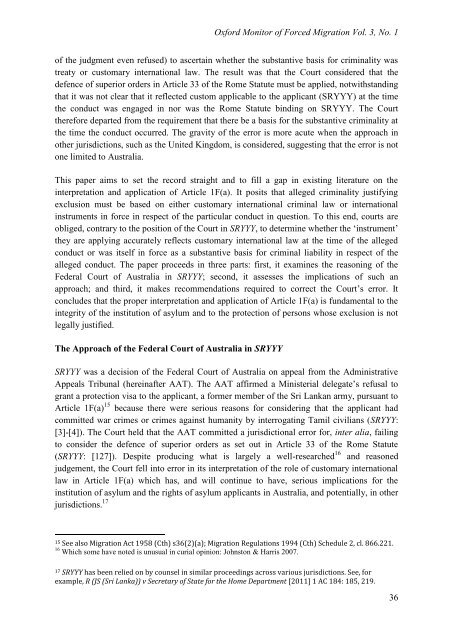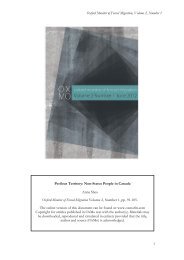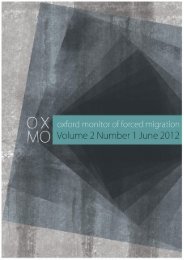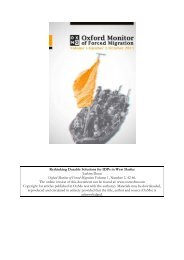Oxford Monitor of Forced Migration, Volume 3, Number 1
Oxford Monitor of Forced Migration, Volume 3, Number 1
Oxford Monitor of Forced Migration, Volume 3, Number 1
You also want an ePaper? Increase the reach of your titles
YUMPU automatically turns print PDFs into web optimized ePapers that Google loves.
<strong>Oxford</strong> <strong>Monitor</strong> <strong>of</strong> <strong>Forced</strong> <strong>Migration</strong> Vol. 3, No. 1<strong>of</strong> the judgment even refused) to ascertain whether the substantive basis for criminality wastreaty or customary international law. The result was that the Court considered that thedefence <strong>of</strong> superior orders in Article 33 <strong>of</strong> the Rome Statute must be applied, notwithstandingthat it was not clear that it reflected custom applicable to the applicant (SRYYY) at the timethe conduct was engaged in nor was the Rome Statute binding on SRYYY. The Courttherefore departed from the requirement that there be a basis for the substantive criminality atthe time the conduct occurred. The gravity <strong>of</strong> the error is more acute when the approach inother jurisdictions, such as the United Kingdom, is considered, suggesting that the error is notone limited to Australia.This paper aims to set the record straight and to fill a gap in existing literature on theinterpretation and application <strong>of</strong> Article 1F(a). It posits that alleged criminality justifyingexclusion must be based on either customary international criminal law or internationalinstruments in force in respect <strong>of</strong> the particular conduct in question. To this end, courts areobliged, contrary to the position <strong>of</strong> the Court in SRYYY, to determine whether the ‘instrument’they are applying accurately reflects customary international law at the time <strong>of</strong> the allegedconduct or was itself in force as a substantive basis for criminal liability in respect <strong>of</strong> thealleged conduct. The paper proceeds in three parts: first, it examines the reasoning <strong>of</strong> theFederal Court <strong>of</strong> Australia in SRYYY; second, it assesses the implications <strong>of</strong> such anapproach; and third, it makes recommendations required to correct the Court’s error. Itconcludes that the proper interpretation and application <strong>of</strong> Article 1F(a) is fundamental to theintegrity <strong>of</strong> the institution <strong>of</strong> asylum and to the protection <strong>of</strong> persons whose exclusion is notlegally justified.The Approach <strong>of</strong> the Federal Court <strong>of</strong> Australia in SRYYYSRYYY was a decision <strong>of</strong> the Federal Court <strong>of</strong> Australia on appeal from the AdministrativeAppeals Tribunal (hereinafter AAT). The AAT affirmed a Ministerial delegate’s refusal togrant a protection visa to the applicant, a former member <strong>of</strong> the Sri Lankan army, pursuant toArticle 1F(a) 15 because there were serious reasons for considering that the applicant hadcommitted war crimes or crimes against humanity by interrogating Tamil civilians (SRYYY:[3]-[4]). The Court held that the AAT committed a jurisdictional error for, inter alia, failingto consider the defence <strong>of</strong> superior orders as set out in Article 33 <strong>of</strong> the Rome Statute(SRYYY: [127]). Despite producing what is largely a well-researched 16 and reasonedjudgement, the Court fell into error in its interpretation <strong>of</strong> the role <strong>of</strong> customary internationallaw in Article 1F(a) which has, and will continue to have, serious implications for theinstitution <strong>of</strong> asylum and the rights <strong>of</strong> asylum applicants in Australia, and potentially, in otherjurisdictions. 1715 See also <strong>Migration</strong> Act 1958 (Cth) s36(2)(a); <strong>Migration</strong> Regulations 1994 (Cth) Schedule 2, cl. 866.221.16 Which some have noted is unusual in curial opinion: Johnston & Harris 2007.17 SRYYY has been relied on by counsel in similar proceedings across various jurisdictions. See, forexample, R (JS (Sri Lanka)) v Secretary <strong>of</strong> State for the Home Department [2011] 1 AC 184: 185, 219.36








